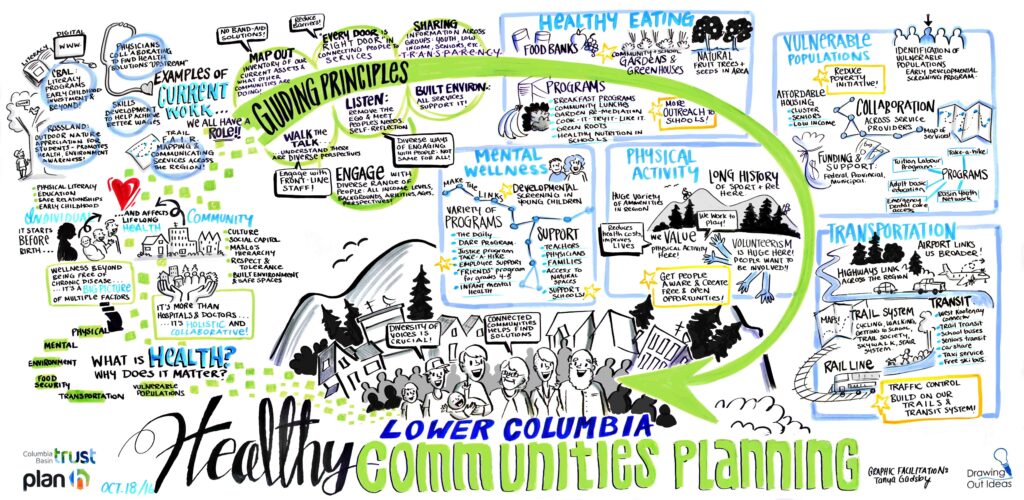More than forty stakeholders from the Lower Columbia Region collaborated over a series of workshops to develop a Healthy Communities Plan. Those involved wrote the plan to create additional support for existing and new initiatives, create efficiencies, and engage stakeholders to work towards a common goal. The City of Trail has now adopted it, and other communities will soon follow.
OPPORTUNITY
In 2011, when South Surrey and White Rock developed their Healthy Community Plan, Trisha Davison, Director of Parks and Recreation for the City of Trail, saw an opportunity for her own community. Davison knew that a regional healthy communities plan could help local governments and other bodies develop a holistic, upstream, and united approach to increasing healthy behaviors. A lens that included not only traditional health indices like active transportation and access to a doctor, but also sustainable food systems and urban planning to promote social connectedness.
However, it would take the next five years to find the right people and the right funding. So, in 2016 when Davison discovered the PlanH grant, she knew she finally had the chance to bring together the different municipalities of the Lower Columbia region to develop a Lower Columbia Healthy Communities Plan (LCHCP). To help her, Davison found four other people and formed a working group: Sonia Tavares from the Columbia Basin Alliance for Literacy, Andrea Winckers from BC Cancer Agency – Prevention Programs, Christy Anderson from the Family Action Network, and Kerri Wall, Community Health Facilitator at Interior Health.
TURNING POINT
To find a way to gather the municipalities to collaborate on the LCHCP the working group innovated. The group compared possible solutions and decided to hold two multi-sectoral workshops set a month apart to allow the ideas, relationships, and the list of community assets developed in the first workshop to percolate. At the second meeting, participants developed shared and actionable goals that focused the collective efforts of the many collaborating agencies.
To help Kerri Wall facilitate the discussion, Tanya Gadsby from Drawing Out Ideas, drew a graphic recording which organized the information visually. This boosted participation and information retention. “People loved those drawings!” said Kerri Wall. “They provided a fascinating focus during the workshop, because you could always look up and orient yourself by seeing what Tanya was drawing. And when we held the second workshop, we hung the first drawing and used it to remind each other of what we had previously explored.”
IMPACT TO DATE
“We brought people together,” said Wall, “new relationships were formed, collective action is being taken on a whole host of initiatives, and improved knowledge about what each organization does to contribute to the health of our communities is more widely known.” In fact, the first workshop went so well, that before the second was held, many organizations had already begun to collaborate.
Additionally, a third, smaller workshop was held to review a draft of the LCHCP, and decide on collective priorities and actions.
Since the workshops ended, a few important impacts have occurred. The City of Trail adopted the LCHCP, and will use it as a decision-making tool for city initiatives. The working group achieved this because Trisha Davison, as an employee of the city, could present and recommend the plan to council as part of a staff report. Council formally adopted the LCHCP on September 18th, 2017.
“The goal now,” said Davison, “is to encourage other municipalities in the region to adopt the plan to unite the region under the shared value of creating healthy communities.” To do this, the working group will travel to the remaining Lower Columbia communities to present the plan at council meetings. The working group does not expect any objections, as elected officials and local government officials from most municipalities participated in the project.
The LCHCP also informed and invigorated two other projects in the Lower Columbia by bringing together organizations: a food security forum in Rossland, and a poverty reduction plan for the region, Surviving Not Thriving: Poverty in the Lower Columbia.
LESSONS LEARNED
“I thought the workshops themselves went great,” said Kerri Wall, “but we’ve had a challenge helping everyone stay under the same umbrella. So, I would say to someone else creating a plan like this – start to brain storm right away how you will keep everyone together once funding runs out: things like a newsletter, quarterly meetings, or a supporting organization.”
“We felt that getting some sectors to the table was more difficult than others (i.e. the business community and Indigenous representation),” said Wall, “and as such, decided more work would be needed in this area. We have just scratched the surface, and ongoing dialogue is needed, and we are struggling with how we continue to resource simply the action of bringing everyone together over time.”




